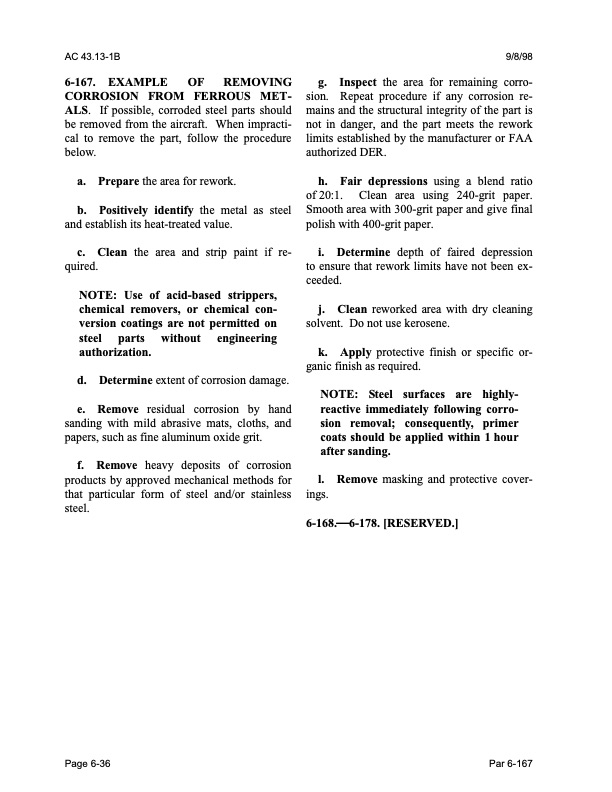
PDF Publication Title:
Text from PDF Page: 305
AC 43.13-1B 9/8/98 6-167. EXAMPLE OF REMOVING CORROSION FROM FERROUS MET- ALS. If possible, corroded steel parts should be removed from the aircraft. When impracti cal to remove the part, follow the procedure below. a. Prepare the area for rework. b. Positively identify the metal as steel and establish its heat-treated value. c. Clean the area and strip paint if re quired. NOTE: Use of acid-based strippers, chemical removers, or chemical con- version coatings are not permitted on steel parts without engineering authorization. d. Determine extent of corrosion damage. e. Remove residual corrosion by hand sanding with mild abrasive mats, cloths, and papers, such as fine aluminum oxide grit. f. Remove heavy deposits of corrosion products by approved mechanical methods for that particular form of steel and/or stainless steel. g. Inspect the area for remaining corro sion. Repeat procedure if any corrosion re mains and the structural integrity of the part is not in danger, and the part meets the rework limits established by the manufacturer or FAA authorized DER. h. Fair depressions using a blend ratio of 20:1. Clean area using 240-grit paper. Smooth area with 300-grit paper and give final polish with 400-grit paper. i. Determine depth of faired depression to ensure that rework limits have not been ex ceeded. j. Clean reworked area with dry cleaning solvent. Do not use kerosene. k. Apply protective finish or specific or ganic finish as required. NOTE: Steel surfaces are highly- reactive immediately following corro- sion removal; consequently, primer coats should be applied within 1 hour after sanding. l. Remove masking and protective cover ings. 6-168.6-178. [RESERVED.] Page 6-36 Par 6-167PDF Image | AFS-640

PDF Search Title:
AFS-640Original File Name Searched:
ac_43.13-1b_w-chg1.pdfDIY PDF Search: Google It | Yahoo | Bing
5,000 BF Shipping Container Lumber Dry Kiln For Quality Lumber The 5,000 BF container kiln consists of one 40 foot high-cube aluminum shipping container... More Info
Shipping Container Lumber Dry Kilns by Global Energy Global Energy designed and developed the container kiln back in 1991. The purpose is to give access to portable sawmill owners, furniture makers, and small business the value added profit of dry kiln lumber and quality hardwoods... More Info
Vacuum Kiln Conversion Kit for Lumber and Wood Dry Kilns Convert your existing conventional dry kiln into a fast drying vacuum kiln. Similar to vacuum bagging in the boat building and aircraft industry, we have come up with a proprietary process which allows you to build a very simple vacuum kiln at a fraction of the price, and without the intensive conventional metal chamber structure... More Info
Vacuum Pump Cart System for Bagging Clamping Wood Drying and more Vacuum Cart with 2HP Pump and Dual Pistons with multiple multiplex vacuum ports and liquid reservoir... More Info
Vacuum Bagging Basics Vacuum bagging is a method of clamping, which has traditionally been used in the composites industry, but can also be used for vacuum drying materials, including wood products... More Info
| CONTACT TEL: 608-238-6001 Email: greg@globalmicroturbine.com | RSS | AMP |